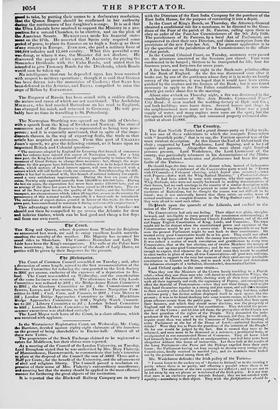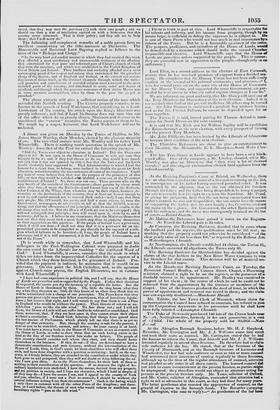Elie Country.
The East Norfolk Tories had a grand dinner-party on Friday week. It was one of those exhibitions to which the renegade Times refers with " heartfelt pride ;" that is to say, the Toryism spouted was of the
most virulent description. At this dinner theEarl of Orford took the chair ; supported by Lord Wodehouse, Lord Bayning, and a ho.t of squires mid parsons. Altogether there were about eight hundred persons present. Lord Wodehouse, the Lord-Lieutenant of the county, was particularly vehement in his denunciations of the Minis- ters. He considered moderation and forbearance bad been the great faults of the Tories— He should hope the time was not far distant when, instead of forbearance and moderation, the watchword of the Conservative party would be " Down with O'Connell—( Vehement cheering, which lasted some minutes)—r!nwn with Popery—down with the Whig-Radical Ministry." (Protracted cheer- ing.) It had been asked by some with surprise, why their opponents, the Whig-Radicals, who were not usually backward in making demonstrations of their forces, bad no such meetings in the country of a similar description with the present ? Far be it from him to pretend to enter into the dark and hidden mysteries of Radicalism, but he thought the reason was not difficult to be found : was it nut universally known that there exists an entire want of mutual confidence—a complete disunion in the Whig-Radical camp ? In fact, they were afraid to meet each other.
He /dwelt upon tine quarrels of the Liberals, and exulted in the union of the Tories— The Conservatives had only one feeling. Their object was plain, straight- forward, and intelligible to every person of the commonest understanding ; it was this—the support of the Protestant Church Establishment, and of the old and happy English Constitution of King, Lords, and Commons. The time might not be far distant when the constitutional power and exertions of the Conservatives would be put to a severe trial. It was impossible to say how soon the present Parliament might be sent back to their constituents. Ile trusted every good Conservative would be at his post. They could not afford to relax in vigilance and vigour while the enemy was everywhere on the alert. It was indeed a matter of much consolation and gratification to every true Conservative, that at the last election, out of twelve Members the county of Norfolk sent up nine good Conservatives ; and he was sanguine and confident enough to expect, that whenever the day of trial came they would be euabled to elect twelve in place of nine, all true Conservatives—all good men and true, determined to support to the very last moment of their existence our invaluable constitution in Church and State, and to mark with horror and detestation the infamous attempts of a turbulent, discontented, democratical faction.
Lord Orford spoke in the same strain— When they saw the Ministers of the Crown basely truckling to a Popish rebel—when they saw those men who Mill dared to call themselves Whigs, the inheritors of the Revolution of 1688, abetting with all their force and power, with all their ingenuity and craft, the supremacy of Popery, and conspiring, to effect the downfal of Protestantism—when they saw these things, well might they band themselves together in a strong and just cause, and call those traitors to their country who refused to join their ranks. True, they had been called a factious party ; but faction seldom displayed itself in open spaces like the present ; it was to be found skulking into some remote corner, to hatch its im- pious schemes secure from the public gaze. The motto which they bore upon their banners, and which they should never diselai llll was the prosperity of England and the maintenance of her constitution. They defended tire prero- gative of the Crown : and let him tell them, tine prerogative of the Crown was the best guardian of the rights of the People. They demanded the inde- pendence of the Peers ; and in malting that demand, did they, he would ask, require more than was asked by the Commons of England on the meeting of every Parliament at the bar of the House of Lords—unlimited freedom of debate? Were they less as Peers the guardians of the interests of the People ? He for one would be judged by the fact. But it seemed they were to be reformed, and once more to be dismissed as a nuisance, a pestilential body, or amalgamated in one concentrated House of Continuos. They all knew what had formerly been the Jesuit of such an amalgamation ; nor had later years been altogether without this lesson of instruction. Let them look at the results of the Long Parliament—the Peers and the Bishops expelled from their own house: the Parliament having sat long enough to destroy every vestige of the Constitution, finally received its merited fate, and its members were kicked out by the greatest rascal among them all."
Mr. Wodehouse defended the Irish policy of the Tories-
" I never listen to the cuckoo cry of 'Justice to Ireland,' or to the creating a parity where them is no parity, and effecting a parallel where there is no parallel. The situations of the two countries are differ-6U; and see are not to be led away by any set phrase or wateliwold of the Irish party. It is not true that ours is an exclusive policy towards Ireland ; they are not satisfied with equality—ascendancy is their object. They wish the fortifications should be razed, that they may man the garrison (?) with their own people; and we should see then a war of retaliation carried on with a bitterness that this country never witnessed. That is their policy ; an they Ask me to help them; that I will never do."
The following self-complacent remarks of a noble parson form an excellent commentary on the tithe-massacre at Dunkerrin. The Honourable and Reverend Lord Bayning replied as follows to the toast of the " Bishops and Clergy."
"In the very kind and cordial manner in which they had received this toast, they afforded a most satisfactory and unanswerable testimony of the affection they entertained for that pure and reformed part of Christ's church of which they were the members, and which was established in the United Kingdom of Great Britain and Ireland. Their kindness and cordiality afforded also a most encouraging proof of the respect and esteem they entertained for the parochial clergy of the diocese, and of England and Ireland, as the earnest and zealous dispensers of divine truth, as the destined channels through which the duties and promises and consolations of revealed religion were conveyed to the most secluded . parts of the country, and distributed to every order and degree of mankind, and through which the gracious assurance of their divine Masten was in some measure accomplished, since by them to the poor the gospel is preached."
The above extracts will give a sufficient notion of the tone which pervaded this Norfolk meeting. The Courier properly remarks, in re- ference to the speech of Lord Wodehouse, that considering he is Lord- Lieutenant of the county, his attack upon the King's Alinisters was grossly indecent ; and that if Lord 'Melbourne does not turn him out of the office which he so grossly abuses, Ministers will deserve to be considered the "craven" creatures the Tories represent them to be. We would lay a wager, however, that Lord Wodehouse will not be molested.



























 Previous page
Previous page